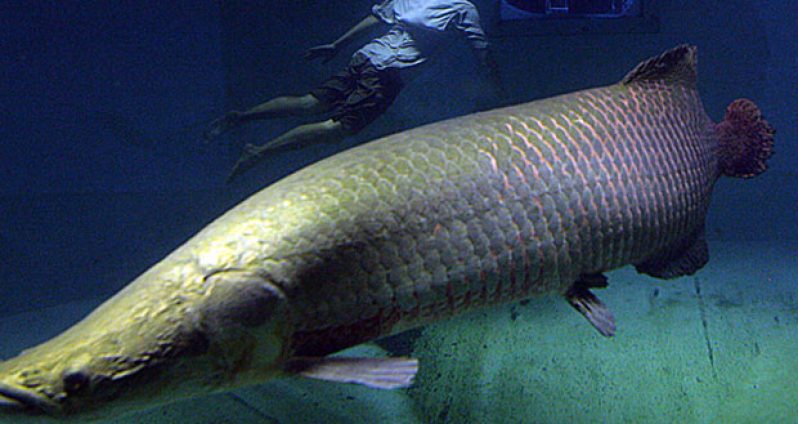A SURVEY has found that over-exploitation of the giant Arapaima fish in the North Rupununi has led to a 31 percent depletion of stocks over the past two years.
The agency carrying out the survey is the North Rupununi District Development Board (NRDDB). It has said there is evidence that without strong management the arapaima is still at risk of being overfished, with all the negative consequences to bio-diversity conservation, the eco-system, and the livelihoods of the sixteen Amerindian communities in the wetlands where the species proliferates.
The NRDDB report said that scientific research and ongoing stock assessments would be necessary to protect the fish, so that sustainable exploitation is possible.
Richardson Haynes, the Fisheries Project Coordinator of the NRDDB survey, stressed: “We also recognise that issues related to arapaima management can be complex, and we would like to work with, and get support from, the Ministry of Natural Resources and the Environment; Ministry of Agriculture, Department of Fisheries; Environmental Protection Agency (EPA) and other stakeholders to ensure the health of this species and (its) environment.”
The stock assessment of the arapaima, which began in September 2013, ends in August 2014. The NRDDB has been undertaking the survey with funding from the Small Grants Programme (SGP) of the Global Environment Facility (GEF), an international body established in October 1991 as a programme to assist in the protection of the global environment, and to promote environmentally sustainable development.
The NRDDB had received the sum of Gy$9.8M to strengthen capacities of their communities to manage the Arapaima fish and fisheries of the North Rupununi wetlands via capacity building, arapaima surveys, conservation education and awareness, consultations, and development of management plans.
The Small Grants Programme of the Global Environment Facility with respect to the arapaima stock assessment and management is being implemented by the local office of the United Nations Development Programme (UNDP).
The arapaima fish is one of the largest fresh water fish species in the world, growing as long as three metres (almost ten feet) and weighing up to 200 kilograms (over 440 pounds).
The species is endemic to the Amazon Basin and is very rare.
The report prepared by Haynes disclosed that the overall arapaima population locally had increased from just over 400 fish in 2002 to 5853 arapaima in 2011.
The growth in arapaima population had allowed a pilot harvest of fish in 2010, and sport fishing for arapaima had grown, with North Rupununi communities being a leader in this area.
A stock assessment during December 2013, however, counted 4022 arapaima, or 1831 less than the 5853 counted in 2011. The data showed that the greatest loss of the arapaima had been in the Essequibo River catchments in the North Rupununi.
The report stated: “Commercial harvesting is suspected to be the reason for this, and it is evident that, without strong management, this species is still at risk.”
Richardson disclosed that fish are an essential resource for the members of the Makushi Amerindian tribe in the North Rupununi.
He said that even though the programme funds will be used up by August, the Board would want to continue being involved in the future development of arapaima management, and to continue working with the regulatory bodies for co-management and enforcement regarding this species.
(By Clifford Stanley)












